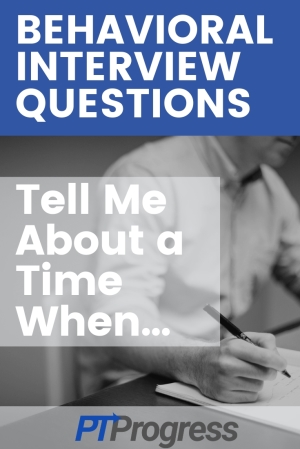 “Tell Me about a Time When….” Behavioral Interview Questions
“Tell Me about a Time When….” Behavioral Interview Questions
During an interview, you might hear a behavioral interview questions that sounds like this, “tell me about a time when…”
Behavioral interview questions draw out experiences and examples of how you handled challenges or managed responsibilities in the past.
Interviewers like asking these questions because they’re looking for problem solvers.
They want to hear about a time where you brought a solution to a problem or adapted to a difficult situation.
When you hear the words, “tell me about a time…” it’s good cue that a behavioral interview question is coming. Before you start your story, use the STAR framework to shape your answer.
STAR Interview Question Technique
STAR stands for:
Situation – Briefly describe the event or setting for the situation at hand.
Task – Identify the task or goal you set out to accomplish.
Action – Describe the steps you took to complete the task.
Result – What happened because of your actions and leadership?
How to Answer Behavioral Based Interview Questions
Using the STAR framework is a great way to concisely share your experiences and accomplishments in response to a behavioral based interview question. But it’s not enough to simply rely on the STAR equation. You need to think through example stories, rehearse it multiple times, and focus on positive outcomes that highlight your strengths.
Create 3 to 4 STAR examples. There’s a good chance you can use the same example for multiple scenarios or prompts. Start thinking through popular scenarios like, “Tell me about a time when you, handled a conflict, resolved a customer complaint, interact with a difficult co-worker, needed to meet a deadline.” Other key scenarios or keywords you might hear: “conflicts, complaints, difficulties, deadlines, pressure, stress, goals, failure, time management, frustrations.”
Rehearse it at least 20 times. When you come up with a story or example, you need to spend at least an hour or two rehearsing the main points in your head. You’re not trying to become a robot and memorize every example in a STAR format. The point is to internalize the format and to have a few solid examples you’re comfortable sharing on the fly.
Focus on positive factors and outcomes. Avoid throwing others under the bus or placing blame on others when you share examples of difficult situations or challenges you resolved. Focus on positive factors and things you learned from the situation.
20 Behavioral Interview Questions
Here are 20 behavioral interview questions you might hear at your next interview.
- Tell me about a time when you faced a difficult decision.
- Tell me about a time when you faced a competing priority.
- Can you share an example of a time you made a mistake at work?
- Tell me about a time you were bored on the job.
- Tell me about a time when you fell short of meeting a goal.
- How do you approach goal setting at work?
- Tell me about a time when people didn’t see eye to eye with you on a project or idea.
- Describe a situation where conflict arose at work and how you handled it.
- Tell me about a time you worked as a part of a team to accomplish a goal.
- Give me an example of a time when a coworker and you didn’t see eye to eye.
- Tell me about a time when you handled a stressful situation.
- How do you handle time constraints on important projects?
- Give an example of how you deal with multiple tasks and responsibilities in your job.
- Tell me about a time when you lacked motivation to start a project.
- Share a time when you dealt with an unhappy customer.
- Tell me about a time when you and your manager or coworker disagreed on something.
- Give me an example of how you prioritize important tasks.
- What motivates you when a project is moving slowly or not the way you were expecting?
- Tell me about a time when you took initiative on a project.
- Tell me about a time when you worked in a high pressure situation.
How to Ask Behavioral Based Interview Questions and Answers
Sometimes interviewer aren’t that great at asking behavioral based interview questions because they use loaded phrases or keywords that help the interviewee develop an answer. I really enjoyed reading this article from Forbes by Mark Murphy that explains the flaws in behavioral interview questions.
Here’s an example of a bad behavioral interview question: Tell me about a time when you had to balance competing priorities for multiple projects you were working on.
This question seems innocent enough but it’s a leading question. Using loaded terms like “balance” or “successfully resolve” can lead the interviewee towards answers they think you want to hear. Instead, interviewers should strip down the questions to avoid loading them with biased terms.
Here’s an example of a good behavioral interview question: Tell me about a time when you faced competing priorities.
These simplified questions are more challenging to answer because they don’t lead the interviewee into a specific direction.
Of course, using the STAR format, an interviewee can create confident answers to any behavioral interview question.
Sample Behavioral Interview Questions and Answers
Let’s dive into a few of these questions with a few sample answers. These answers will attempt to use the STAR framework. Remember, STAR stands for:
Situation – Briefly describe the event or setting for the situation at hand.
Task – Identify the task or goal you set out to accomplish.
Action – Describe the steps you took to complete the task.
Result – What happened because of your actions and leadership?
Tell me about a time when you faced a difficult decision.
Our department was facing budget cuts along with many other departments within the hospital. My goal was to identify ways to decrease costs without cutting staff hours. Using LEAN principles from the Six Sigma class I completed earlier that year, I lead my team in reducing waste ranging from office supplies to clinic equipment materials without compromising patient care. We also eliminated the need for overtime by rearranging the work schedules and ended the fiscal year 10% under budget.
Tell me about a time when you faced a competing priority.
The busy season for our financial sales team occurs in August as our major clients are universities and community colleges who use our retirement planning services. This past year our company executives requested 10% of our sales representatives to attend a national conference in August, the busiest time for our production. I recommended a rotational schedule that kept our commitments for the universities but allowed the sales representatives to cover 1 to 2 days at the conference between client visits. The team agreed to trial the rotating schedule which allowed us to provide coverage as well as meet our team goals for the year.
Can you share an example of a time you made a mistake at work?
“I don’t make mistakes”. Just kidding. Don’t ever answer a question like that. You can kiss your chances of a job offer goodbye with those 4 words.
Before we transitioned to electronic investment allocations, our advisors manually requested changes to portfolios. After a meeting with a client, I failed to submit the changes and recognized the mistake near the end of the week. I presented the error to my manager and worked with the accounting department to calculate the corrections to his account. I made sure future errors like this did not happen by creating an automatic reminder system through our CMS, which reduced these errors company wide by 5%.
Tell me about a time you were bored on the job.
As a Physical Therapist there are some routine cases like total knee replacements that can become repetitive over time. I noticed I was becoming bored with the protocols, so I decided to create a rehab program that focused on patient education. I used this as motivation to create a 20 page question and answer booklet as well as a pre-operative total joint replacement class to be hosted at our clinic. The class was a success, resulting in a 20% conversion rate for new patient and boosted our volume by 5%.
So what about you? Tell me about a time when a conflict arose at work. Practice your answer in the comments and give someone inspiration by answering one of the questions above.

